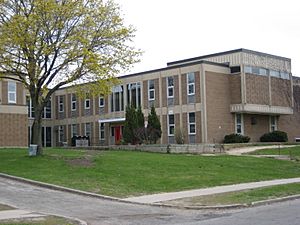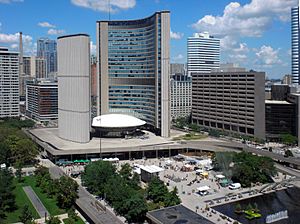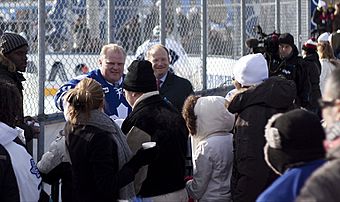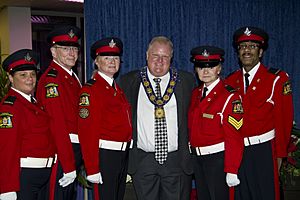Rob Ford facts for kids
Quick facts for kids
Rob Ford
|
|
|---|---|
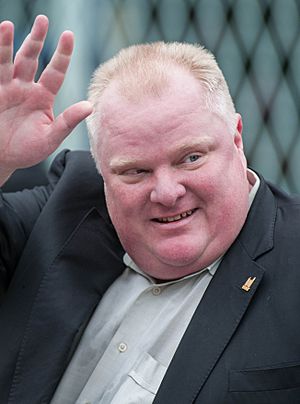
Ford in 2013
|
|
| 64th Mayor of Toronto | |
| In office December 1, 2010 – November 30, 2014 |
|
| Deputy |
|
| Preceded by | David Miller |
| Succeeded by | John Tory |
| Toronto City Councillor for Ward 2 Etobicoke North |
|
| In office December 1, 2014 – March 22, 2016 |
|
| Preceded by | Doug Ford |
| Succeeded by | Michael Ford |
| In office November 14, 2000 – November 30, 2010 |
|
| Preceded by | Ward established |
| Succeeded by | Doug Ford |
| Personal details | |
| Born |
Robert Bruce Ford
May 28, 1969 Etobicoke, Ontario, Canada |
| Died | March 22, 2016 (aged 46) Toronto, Ontario, Canada |
| Resting place | Riverside Cemetery |
| Political party | Independent (2000–2016) |
| Other political affiliations |
Progressive Conservative |
| Spouse |
Renata Brejniak
(m. 2000) |
| Relations |
|
| Children | 2 |
Robert Bruce Ford (May 28, 1969 – March 22, 2016) was a Canadian politician and businessman who served as the 64th mayor of Toronto from 2010 to 2014. Before and after his term as mayor, Ford was a city councillor representing Ward 2 Etobicoke North. He was first elected to Toronto City Council in the 2000 Toronto municipal election, and was re-elected to his council seat twice.
Contents
Early life
Ford was born in Etobicoke, Ontario, Canada, in 1969, the youngest of the four children (Doug, Kathy, Randy and Rob) of Ruth Diane (née Campbell) and Douglas Bruce Ford. His paternal grandparents were English immigrants. His father, along with Ted Herriott, was co-founder of Deco Labels and Tags, which makes pressure-sensitive labels for plastic-wrapped grocery products at an estimated CA$100 million in annual sales, and was a Progressive Conservative member of the Provincial Parliament (MPP) from 1995 to 1999.
Ford attended Scarlett Heights Collegiate Institute in Etobicoke. He dreamed of becoming a professional football player, and his father paid for him to attend special camps of the Washington Redskins and the University of Notre Dame. After graduating from high school, Ford went to Carleton University in Ottawa to study political science. He made the football squad, but did not play in any games. He left Carleton after one year to return to Toronto and did not complete his degree. After Carleton, he started a sales job at Deco. After Doug Ford Sr.'s death in 2006, the Ford family retained ownership of Deco Labels through the Doug Ford Holdings corporation. Ford, alongside his brothers and their mother was a director of the company.
In August 2000, Ford married Renata Brejniak, whom he had met in high school, at All Saints Roman Catholic Church in Etobicoke. They had been dating since Brejniak's divorce from her first husband in February 1996. Ford lived with Renata and their two children, Stephanie and Doug, in Etobicoke until his death in 2016.
Political career
City councillor
Ford served three terms as city councillor from 2000 until October 2010, representing Ward 2 Etobicoke North. During his term as councillor, Ford was a strong critic of councillors' spending. Ford was known for his controversial comments and passionate arguments at council.
Ford first ran for Toronto City Council in 1997, placing fourth to Gloria Lindsay Luby in Ward 3 Kingsway-Humber. Ford ran for councillor in Ward 2 Etobicoke North in the following election in 2000, getting the endorsement of the Toronto Star. Ford defeated incumbent Elizabeth Brown in what was considered one of several upsets in Etobicoke. According to Ford, "the people said they wanted change and they got change".
Ward 2 is located in the north-west corner of the city in the former city of Etobicoke. The ward's population of over 50,000 in 2006 was 53% composed of immigrants, the largest group being South Asians. It is mixed in nature with 40% of dwellings being single-family detached homes and 35% being high-rise apartments. It is also known as an area that has seen gang violence.
Ford had previously resided in the ward, but moved in 2000 prior to the election, after his marriage, to Ward 4. In 2003, Ford was re-elected with 80% of the vote in Ward 2, defeating two candidates from the local Somali community. In the 2006 election, Ford won again, defeating Somali-Canadian candidate Cadigia Ali, this time with 66% of the vote.
2001 municipal budget
It was during the 2001 budget deliberations that Ford earned a reputation for passionate speeches. The City of Toronto was facing a several hundred million dollar budget shortfall, enough to require a 32% tax increase after the Government of Ontario shifted the delivery of services from itself to Toronto, who would have to then pay for them. Toronto Mayor Mel Lastman was pleading with other governments for financial assistance. According to Don Wanagas, the National Post City Hall columnist, the other councillors began to dread when Ford rose to speak. "I have to give my head a shake because some of the rhetoric that comes out of the mouths of some of these councillors boggles my mind, I swear. ... Get the government out of our backyards. It's ridiculous. Government red tape here. Bureaucratic here. It's nonsense having all this government. And it's nonsense. It's so ridiculous. If you don't like what the province is doing, there's going to be an election in June of '03 – before our election, by the way."
Ford proposed a cut to each councillor's $200,000 office budget, money for travel to conferences, ending city limousine usage and club memberships. According to Ford, "if we wiped out the perks for council members, we'd save $100 million easy." Ford was one of only four councillors who voted against a 5% increase in property taxes for 2001. Ford made a point of not using his allotted city budget for his office expenses, paying for the expenses from his salary. He claimed $10 for his first year, and $4 for his second year. In Ford's opinion, "all this office budget stuff is self-promotion to benefit yourself. Why should the taxpayers have to pay for it? It boggles my mind."
2002 municipal budget
During the debates around the 2002 municipal budget, Ford and Councillor Giorgio Mammoliti got in several heated exchanges, where Mammolitti called Ford a "goon" and Ford called Mammolitti a "scammer". The argument got heated to the point where Ford called Mammolitti a "Gino-boy". Mammolitti called the insult a "racist remark" and filed a complaint with the city's human-rights office. Three councillors stated that they heard the insult said by Ford, who denied it. Ford dismissed the councillors stating that they were liars if they thought he had made a racist remark. "I'm a conservative and the majority of people are left-wing and cannot stand my politics." The exchanges led Councillor Pam McConnell to complain about "testosterone poisoning" in the chamber. Ford extended his exchanges outside the chamber with columnist John Barber of The Globe and Mail: "I am not a racist. Anyone who calls me a racist is going to face the consequences!", to which Barber replied "You are a racist."
2003 municipal election
In the 2003 municipal election, Ford endorsed twelve political candidates on a platform of fiscal responsibility to take on fellow councillors: "We just need to get rid of these lifelong politicians that just give out money to special interest groups and don't serve the community. I'm really teed off. We need to get a new council or this city is going to go down the drain." Ford targeted Brian Ashton, Maria Augimeri, Sandra Bussin, Olivia Chow, Pam McConnell, Howard Moscoe and Sherene Shaw. Shaw was defeated by Ford's future budget chief Michael Del Grande, while the rest were re-elected.
Ford made a priority of responding to local constituents' problems, often returning calls himself or meeting with city staff to resolve problems. In 2005, local radio station AM 640 tested councillors on their response by having a reporter make an after-hours call to report a pothole. Ford was one of only three councillors to call back in person, within a day. His zeal in attending to constituents' problems became a competitive rivalry with fellow councillors Howard Moscoe and Gloria Lindsay Luby.
In June 2006, Ford spoke out against the city donating $1.5 million to help prevent AIDS, arguing that most taxpayers should not be concerned with AIDS. Ford publicly apologized for the comments in May 2010 during his mayoral campaign after his opponent, George Smitherman, called Ford's character into question over the remarks. At a council meeting on March 5, 2008, Ford stated "Those Oriental people work like dogs", a remark he later formally apologized for while stating that he meant it as a compliment.
On March 7, 2007, Ford spoke out against cyclists sharing roads with motorists, which were "built for buses, cars, and trucks, not for people on bikes". As councillor, Ford opposed the installation of bike lanes on University Avenue and Jarvis Street and during his election campaign, proposed spending money on off-road cycle paths. Bike lanes were installed on Jarvis in 2010 over the objection of traffic advocates, and Ford made it a priority to get them removed during his campaign. As mayor, he was able to get council to reverse the decision in 2011, a move which was criticized by cycling advocates and led to protests. The Jarvis bike lanes, which cost the city $86,000 to install in 2011, were removed in December 2012 at a cost of $200,000–$300,000. At the same time, physically separated bike lanes on Sherbourne Street were installed. Toronto Cyclist Union president Andrea Garcia praised the Sherbourne lanes installation: "Cities all across North America that are doing way more innovative things for cyclists have been building separated bike lanes for a long time ... It's great to finally see Toronto catch up." However, she also regretted the loss of lanes on Jarvis: "People live and work and go to school on both of these streets and they all need a safe way to get to these places."
2010 Toronto mayoral election
Ford was elected mayor with 383,501 votes (47%) over George Smitherman's 289,832 (35.6%) and Joe Pantalone with 95,482 (11.7%). The voter turnout was around 52% of registered voters, the highest in Toronto's post-amalgamation history. Ward-by-ward electoral results showed that Ford had won all of the former pre-amalgamation suburbs, while Smitherman topped districts in the pre-amalgamation Toronto districts. Ford received 80,000 votes from the "Downtown 13" wards, or 20% of his total votes. Ford ran on a populist platform of fiscal conservatism and subway expansion.
Mayor
After the election, Ford had outgoing councillor Case Ootes, a former City of Toronto budget chief, head the "transition team". From his campaign team, Ford named Nick Kouvalis as his chief of staff; Mark Towhey, who had drafted his campaign platform, as his policy advisor; and Adrienne Batra, his communications advisor, as press secretary. Councillor Doug Holyday, who had helped elect Doug Ford Sr., was named deputy mayor. For the executive committee of City Council, Ford named councillors who had endorsed him in his campaign. For the inauguration ceremony at the first meeting of the new council, Ford had television commentator Don Cherry introduce him and put the chain of office on him. Cherry garnered some controversy with his remarks. Cherry described how Ford had reversed a mistake of city staff cutting down a tree of a Toronto property owner for no good reason and then billing the property owner, who suffered from Alzheimer's. Cherry added "Put that in your pipe you left-wing kooks" and, in regards to the pink suit he was wearing, "I'm wearing pinko for all the pinkos out there that ride bicycles and everything, I thought I'd get it in." At its first meeting in December 2010, the council voted to cancel the annual $60 personal vehicle registration tax passed by the previous council. The tax cancellation, a campaign promise of Ford's, took effect on January 1, 2011.
During the first year in office, the council mostly endorsed Ford's proposals. Ford privatized garbage pickup west of Yonge Street. Previously, only Etobicoke had privatized waste removal. Ford's first year as mayor in 2011 saw no property tax increase, and subsequent years' increases were less than the rate of inflation. Under Ford, council voted to declare the TTC an essential service. Ford reduced, but was unable to completely remove, the Miller-era land transfer tax. During the summer of 2013, City Council endorsed Ford's plan to cancel the "Transit City" transit plan and build the Scarborough Subway Extension fulfilling one of Ford's main campaign promises. This project was later approved and received funding both provincially and federally. In later years, Council would reject Ford's transit plans, including not putting the Crosstown LRT underground for its entire route. Near the end of Ford's term, Ford's powers were reduced by Council, spurred by Ford's personal problems.
Rob Ford's brother Doug Ford was the Toronto city councillor for Ward 2 Etobicoke North in Toronto from 2010 to 2014, during Rob's term as mayor.
2014 election
Ford registered on January 2, 2014, as a candidate in the fall's mayoral election. Ford participated in several debates but went on a leave of absence in May and June. Ford returned from his leave of absence in July and was polling in second place, behind John Tory and ahead of Olivia Chow. On September 12, 2014, Ford suddenly withdrew his candidacy due to the discovery of a tumour in his abdomen which was suspected to be, and subsequently confirmed to be cancerous. His brother Doug registered as a mayoral candidate in Ford's place and Ford instead registered as a candidate for city councillor in his old constituency of Ward 2 Etobicoke North. Doug Ford, with 33% of the vote, was defeated in the October 27 mayoral election by Tory, who received 40%, while Rob Ford was successful in Ward 2, being elected with 58% of the vote. Ford's term as mayor ended on November 30, 2014. He stated that he intended to run for mayor again in 2018.
Personal life
Football coaching
Ford volunteered his time to coach high school football. Ford first coached at Newtonbrook Secondary School in 2001, until he was dismissed over a dispute with a player. He coached at Don Bosco Catholic Secondary School from 2001 until 2013 when the Toronto Catholic District School Board dismissed him after a controversial television interview led to a review of his coaching. Ford had donated $20,000 to equip the Don Bosco team and started a foundation, called the Rob Ford Football Foundation, to fund teams at other underprivileged schools struggling to field football teams.
In September 2017, Toronto Mayor John Tory, along with Councillor Stephen Holyday and the Ford family, proposed renaming Centennial Park Stadium to Rob Ford Memorial Stadium to honour Ford's coaching. City council rejected the proposal, 24–11 in a vote on October 5, 2017.
Illness and death
After developing severe abdominal pains, Ford was admitted to Humber River Regional Hospital in North York in September 2014 with an abdominal tumour, and a biopsy was taken. Ford announced that he would not run in the 2014 Toronto mayoral election because of his illness; his brother Doug would run in his place. Ford chose to run for his former Ward 2 seat on the City Council. He was likely to shortly begin treatment with multiple chemotherapy agents; the doctor did not say whether Ford would need to have surgery or radiation treatments.
On September 17, 2014, Dr. Zane Cohen of Mount Sinai Hospital (the lead doctor of Ford's health care team) revealed that Ford had been diagnosed with pleomorphic liposarcoma, a rare form of cancer that arises in adipose tissue (fat). Ford was treated with chemotherapy and surgery. After chemotherapy and radiation therapy, Ford announced in a press conference that he was going to have a lengthy surgery done on May 11, 2015, to remove the tumour. He said he would be "out of commission" for four months. At a community barbecue hosted by the Ford family in 2015, Rob announced that doctors had cleared him of cancerous tumours.
On October 28, 2015, Ford revealed, and his physician confirmed, that a new tumour was growing on his bladder. The next day, Doug Ford advised reporters that the tumour had been found to be cancerous and consistent with liposarcoma (the previous tumour), based on a CT scan.
On March 17, 2016, Ford's office announced he was in the hospital "with his family beside him" as chemotherapy treatment had not been successful, and Ford's health was being reviewed to determine if he could continue treatment. The Ford family thanked the many who had wished the former mayor well in recent weeks, but requested privacy. A Rob Ford "get-well-soon" website was set up by the Ford family to send positive messages to Ford while he received cancer treatment; it received over 5,000 messages from well-wishers in the first two weeks after its creation.
On March 21, 2016, Ford's office confirmed that he had been placed into palliative care at Mount Sinai Hospital. Ford died the following day, March 22, at the age of 46. After his death, City Hall started an official period of mourning. Flags at municipal buildings were lowered to half-staff; a book of condolences was started at City Hall, chalk was provided for personal messages on the pavement of Nathan Phillips Square, similar to that after the death of Jack Layton; and the 3D Toronto sign was dimmed at the square. Visitations were held at City Hall for two days with the Ford family present. On March 30, a public funeral service was held at St. James Cathedral followed by a public commemoration of his life at the Toronto Congress Centre in the evening. Ford was buried at Riverside Cemetery in Etobicoke where his father is also buried.
His brothers Doug and Randy took on stewardship of Rob's share of Deco Labels and Tags upon his death.
Legacy
Supported by the Ward 3 incumbent, Stephen Holyday, and the Ford family, in September 2017, Toronto Mayor John Tory proposed renaming Centennial Park Stadium after Ford. The city council rejected the proposed renaming on October 4, 2017.
See also
 In Spanish: Rob Ford para niños
In Spanish: Rob Ford para niños
- Ford family (Canada)
- Crazy Town: The Rob Ford Story, 2014 biography by Robyn Doolittle
- Rob Ford conflict of interest trial
- Timeline of Rob Ford video scandal


